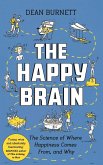This compendium includes the following 5 complete books featuring renowned neuroscientists Lisa Feldman Barrett, Jennifer Groh, Kalanit Grill-Spector, John Duncan and Miguel Nicolelis providing fully accessible insights into cutting-edge academic research while revealing the inspirations and personal journeys behind their research. The books are explicitly designed to provide a unique window into frontline research and scholarship that wouldn't otherwise be experienced through standard lectures and textbooks. A detailed preface highlights the connections between the different books and all five books are broken into chapters with a detailed introduction and questions for discussion at the end of each chapter: I. Constructing Our World: The Brain's-Eye View - A conversation with Lisa Feldman Barrett, University Distinguished Professor in Psychology at Northeastern University. This wide-ranging conversation explores Feldman Barrett's research on how the brain works and the development of her theory of emotion: every moment of our life, our brain is anticipating and making sense of sensory inputs from its environment-the combination of the internal environment of the body and the external environment-and our brain uses conceptual knowledge to perform those tasks. II. Knowing One's Place: Space and the Brain - A conversation with Jennifer Groh, Professor of Psychology & Neuroscience at Duke University. After an inspiring story about her academic journey, this conversation examines Jennifer Groh's extensive research on how the brain combines various streams of sensory input to determine and predict where things are, together with the corresponding implications for a wide range of issues, from neuroplasticity to evolutionary mechanisms. III. Vision and Perception - A conversation with Kalanit Grill-Spector, Professor in Psychology and the Stanford Neurosciences Institute at Stanford University. Kalanit Grill-Spector is a vision specialist with a background in computational neuroscience. Her research examines how the brain processes visual information and perceives it. Topics covered include: how functional imaging techniques are used to visualize the brain in action and how it functions to recognize people, objects and places; how the anatomical and functional properties of the brain change from infancy to childhood through adulthood, and how this development is related to improved visual recognition abilities. IV. Investigating Intelligence - A conversation with John Duncan, Professor of Neuroscience, University of Cambridge. This detailed conversation examines important questions in neuroscience such as: What is intelligence and what does IQ testing tell us? Can intelligence be measured and improved? What role does our frontal lobe play in executive control? Further topics covered include: impairments following brain damage, functional brain imaging, and the brain basis for attention, intelligence and cognitive control. V. Minds and Machines - A conversation with Miguel Nicolelis, Professor of Neurobiology, Neurology, Neurosurgery, Biomedical Engineering, Neuroscience at Duke University. This comprehensive conversation dives into Nicolelis' extensive research activities and how he has been blurring the line between science fiction and science fact, developing increasingly sophisticated ways of harnessing the thoughts of rats, monkeys and humans to drive mechanical devices in the rapidly emerging field of brain-machine interfaces (BMI).
Hinweis: Dieser Artikel kann nur an eine deutsche Lieferadresse ausgeliefert werden.
Hinweis: Dieser Artikel kann nur an eine deutsche Lieferadresse ausgeliefert werden.








